Plato’s Cave and the Construction of Reality in Postmodern Movies
Ancient Greek philosophers like Plato were the first to propose ideas that people have been exploring ever since. From time to time, writers will present an idea that seems original but is a rehash of these old ideas. Writers referred to as postmodernists have explored the meaning of reality in books and movies. Plato also philosophized about reality, most famously in his allegory of the Cave. This allegory can give us a deeper understanding of certain modern (or postmodern) movies about constructed reality, such as The Matrix and Inception. In turn, understanding these movies in a new light can teach us something about our own relationship with reality.

The Allegory of the Cave
Plato’s Cave is a thought experiment. Suppose you find an underground cave where several people are chained to the floor. Their chains hold them in place and prevent them from turning their heads, so the only thing they can see is a wall in front of them. On this wall, they see shadows projected by people on a raised platform behind the prisoners, “like the screen which marionette players have in front of them, over which they show the puppets”. 1
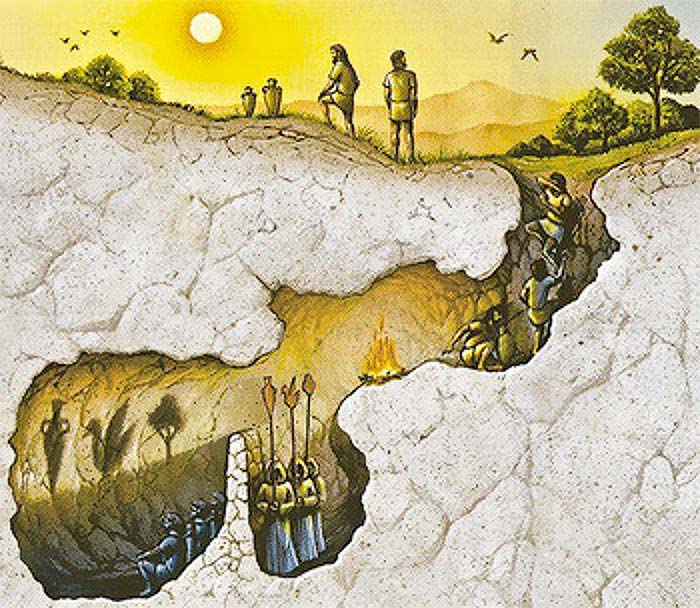
For the purposes of the thought experiment, Plato assumed these prisoners have been in this position for most of their lives – they don’t remember a time when they saw or experienced something other than these shadows. Therefore, their entire reality is made up of the shadows and the echoes emanating from the back of the cave. As an outside observer, you know these shadows aren’t “real” because you are aware of other things that are more real. The prisoners, however, have no definition of “real” beyond what they have experienced.
Plato proposed what would happen if one of these prisoners was suddenly set free and allowed to see not only the puppeteers on the platform but also the rest of the world outside the cave. First, because he had never faced in the direction of a light source before, he would have some difficulty physically comprehending what he was seeing. Then he would have difficulty accepting the idea that there was more to reality than his previous experiences. “Will he not fancy,” Plato asked, “that the shadows which he formerly saw are truer than the objects which are now shown to him?” Even when the prisoner did accept that what he was now seeing was real and the shadows were only imperfect representations, he would still have ahead of him the process of learning what everything was and what it meant.
Plato went on to suggest that the cave was a metaphor for our own world, that there are concepts beyond our experience that are even more “real” than the version of reality we observe regularly. The prisoner’s journey into the real world is a metaphor for our own learning process as we come to understand those concepts.
Called to Adventure on the Surface
In the Hero’s Journey, a theory of narrative structure popularized by Joseph Campbell, protagonists must leave their Ordinary World and cross a Threshold into the Special World. In Plato’s allegory, the cave is the Ordinary World, the circumstances (if not a physical location) the characters have been in before the story begins. An Inciting Incident, such as someone from outside the cave freeing a prisoner, acts as a Call to Adventure.
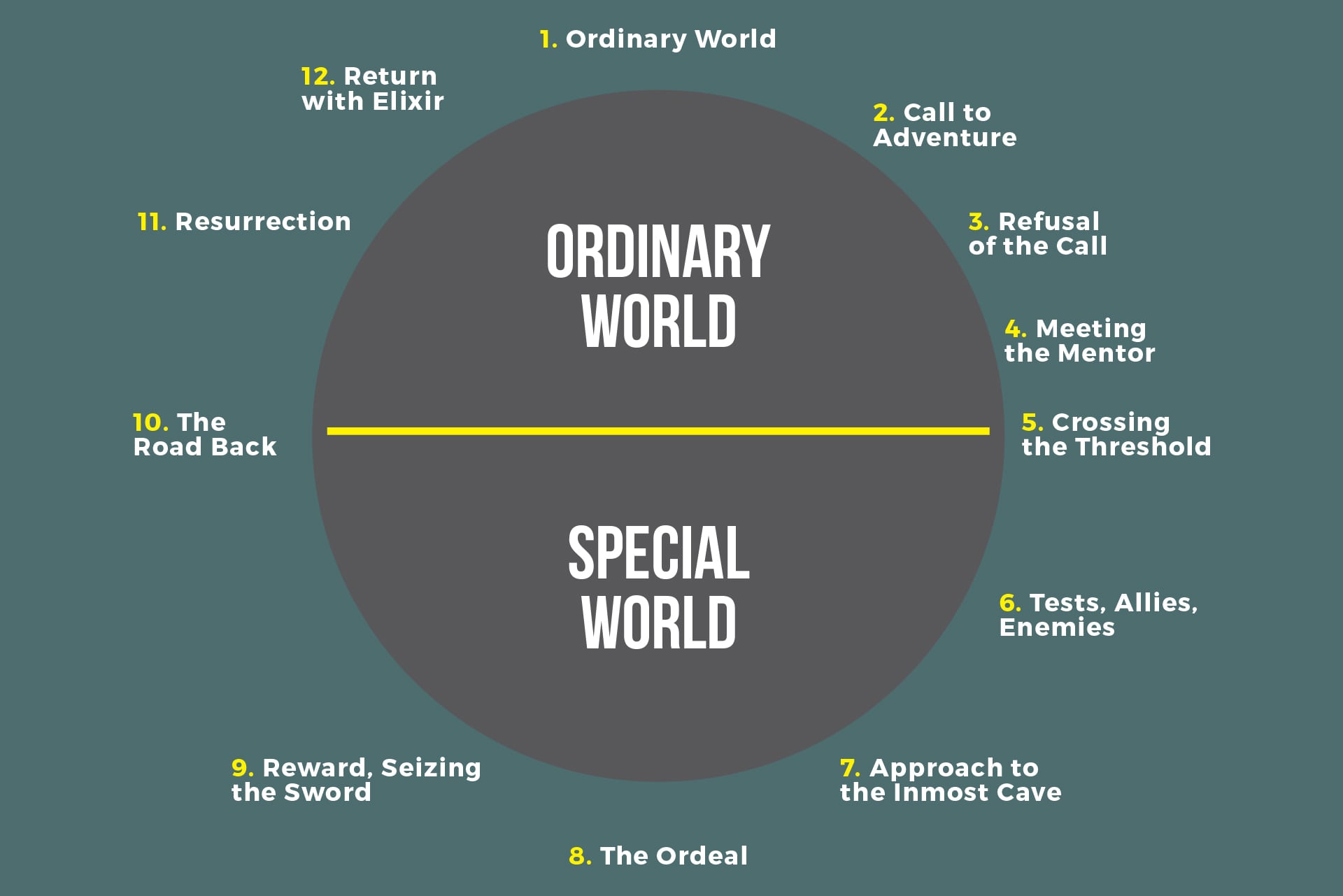
The real world outside the cave may not seem like a “Special World” to most people, but this is because most people are residents of that world. From the perspective of the freed prisoners, the world beyond their previous experience is full of adventure. According to Plato’s allegory, the deeper concepts we learn about when we dare to exceed our perceived reality are just as “Special” as our surface world would be to cave-dwellers.
It can be very interesting to find examples of the stages of the Hero’s Journey in various movies. Comparing them to Plato’s Cave can lead to similar insights in understanding not only the narrative of the movies but also what they say about the people who watch them.
“I Don’t Want to Live in your Stupid World!”
The 2015 film Room, based on a novel of the same name, bears some similarities to Plato’s allegory. Born in captivity, five-year-old Jack Newsome has never seen the outside of Room, the shed he shares with his mother, except through a skylight and television programs. When his mother, Joy, decides to make an escape attempt, she must first explain to Jack that there is a real world beyond the walls of Room.
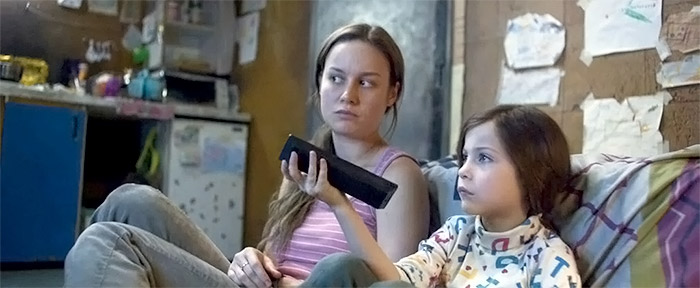
At first, Jack resists the idea of an outside world, partly due to naivety but also due to fear of the unknown. It is understandable that the prisoners in Plato’s allegory would have similar reservations about leaving the cave. The process of leaving Room and adjusting to the outside world is a coming-of-age journey for Jack, just as the journey out of the cave of shadows is a metaphor for learning.
“Free Your Mind.”
The 1999 sci-fi action film The Matrix seems to be heavily inspired by Plato’s Cave. In this movie’s post-apocalyptic world, humans are kept prisoner underground and shown a false reality called the Matrix. Because they have been in this mind prison since birth, they have no idea their world is not real unless someone on the outside “wakes them up” and starts them on the journey back to the real world.
When the movie’s protagonist, Thomas “Neo” Anderson, exits the Matrix and finds himself back in his real body, one of his first comments is that his eyes hurt. Morpheus, his guide, says, “You’ve never used them before.” This detail is taken almost directly from Plato’s Cave to help build the movie’s world.
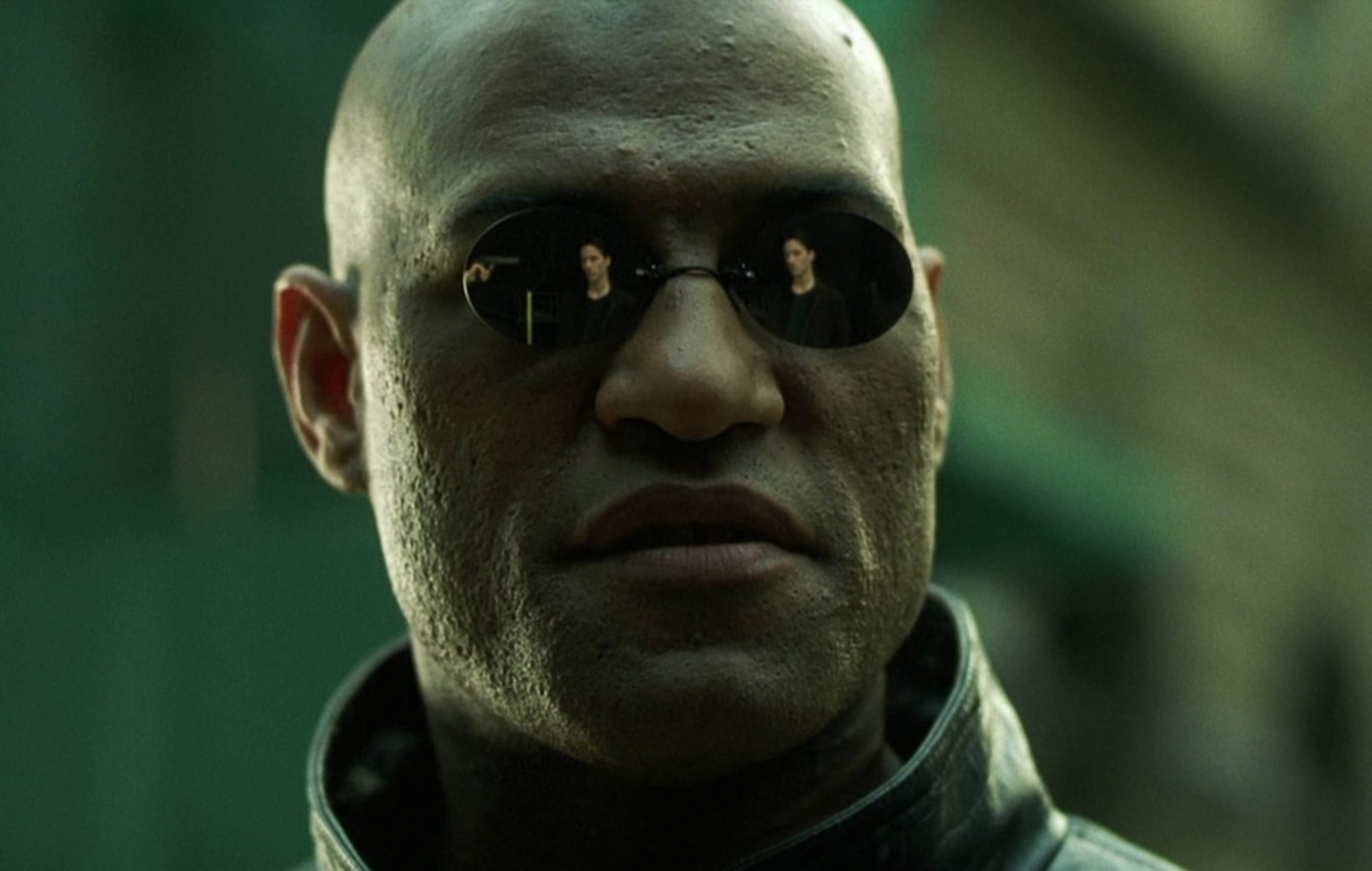
Unlike Plato’s allegory or Room, when prisoners are freed from the Matrix, they cannot focus entirely on learning about the real world. This is because they are caught up in a conflict against the machines, the creators of the Matrix, who would like to either put them back in the virtual reality or kill them to prevent their freeing anyone else. The protagonists’ continued quest to free other prisoners represents the philosophy that freedom from the cave of shadows – understanding the deep truths beyond our perceived reality – is paramount.
“Nothing is Fake; it’s merely Controlled.”
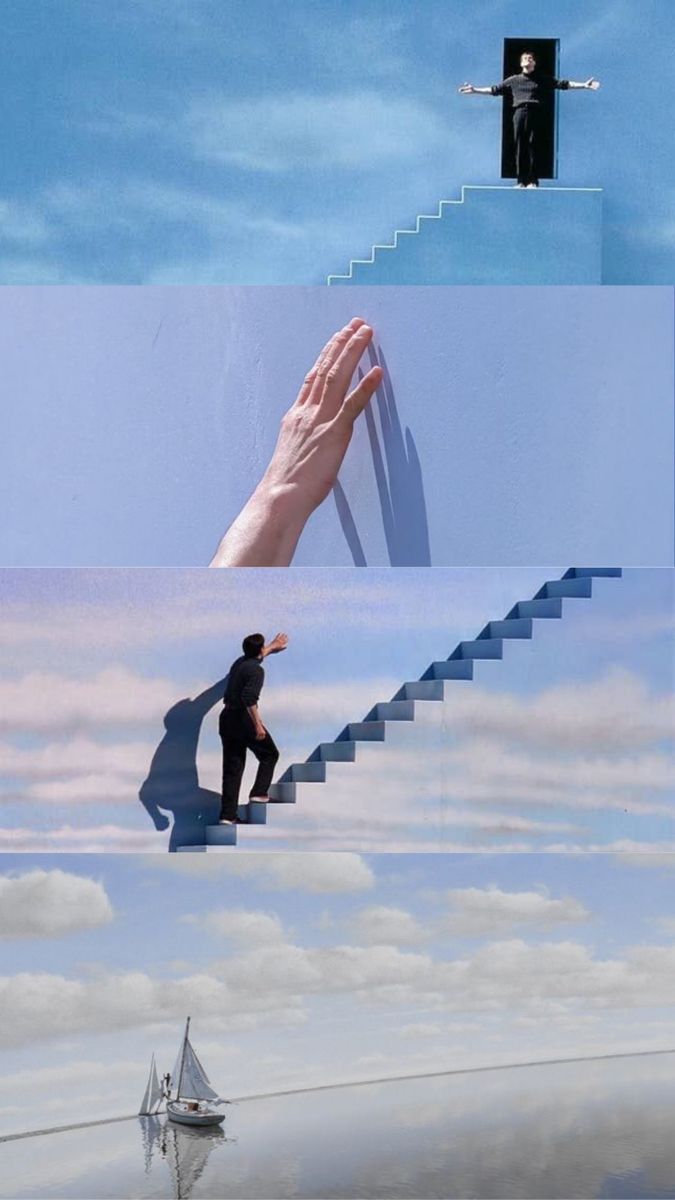
Another movie with elements similar to Plato’s Cave is The Truman Show. In this 1998 psychological comedy, the cave is a massive dome-shaped film set, and the prisoner is Truman Burbank. Unbeknownst to Truman, every aspect of his life is carefully curated by a production crew for a live, 24-hour, worldwide broadcast. Every single person he sees is an actor, and even the weather is artificially generated. A minority section of the show’s viewers believe the show is unethical, that Truman is a prisoner who deserves to be free.
Due to a series of accidents, Truman begins to realize his world is not genuine, and he tries to escape. The production crew and the actors desperately try to stop him while still maintaining the illusion, but this eventually becomes impossible. The movie ends with Truman leaving the set, so the movie’s audience never learns how he reacts to the outside world.
Why Would Someone Stay?
Seeing the journey out of the cave as a metaphor for learning is not the only interpretation of Plato’s allegory. A more modern (or postmodern) interpretation compares the shadows in Plato’s Cave to the constructed reality people build for themselves through things like technology.
As Jean Baudrillard explained it, people no longer use “simulacra” as substitutes for real things when the genuine article is not available or too expensive; we now turn to false things without even considering real things, as if we cannot tell the difference. 2 For example, some women take their beauty standards from models in magazines and social media while disregarding input from people they knows and interact with face-to-face. In response to Plato’s allegory, Baudrillard would argue that we dig ourselves into a cave of shadows. Leaving the cave, then, is as simple as rejecting these falsehoods and accepting reality.
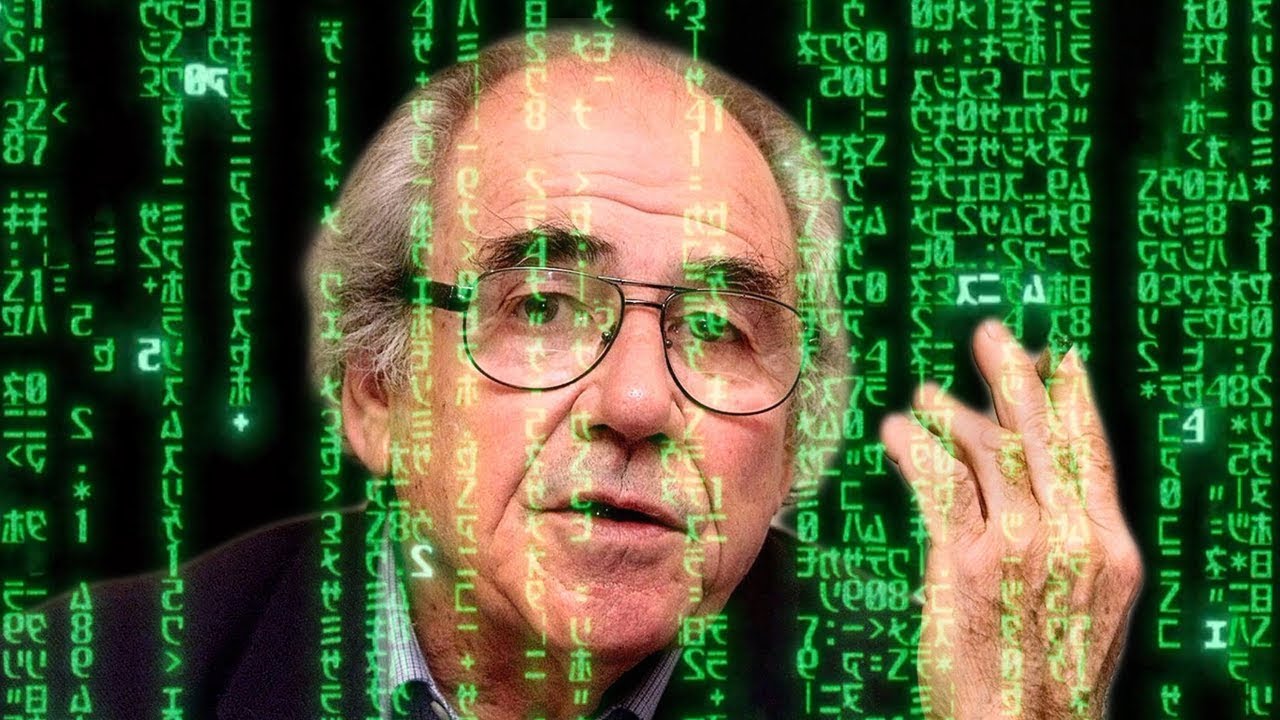
Plato proposed that a free prisoner would ultimately consider the real world preferable to the cave of shadows. “And when he remembered his old habitation… and his fellow prisoners,” Plato said, the free prisoner would “pity them.” Modern films sometimes challenge that idea.
Many characters are initially reluctant to leave their Cave of Shadows. The Cave can be a comfort zone for the prisoners, and many moviegoers relate to the desire to stay in the comfort zone. This fits the “Refusal of the Call to Adventure” stage in the Hero’s Journey. Also, if Baudrillard was right and people willingly choose shadows over real things, the prisoners will be even more reluctant to turn away from the shadows.
In Room, after his escape, Jack admits that he sometimes misses Room. Joy, who spent seven years in Room, has an even harder time adjusting to the outside world. She attempts suicide, and in one shot she is seen back in Room – her prison became her comfort zone, and she has not yet mentally escaped her captivity.
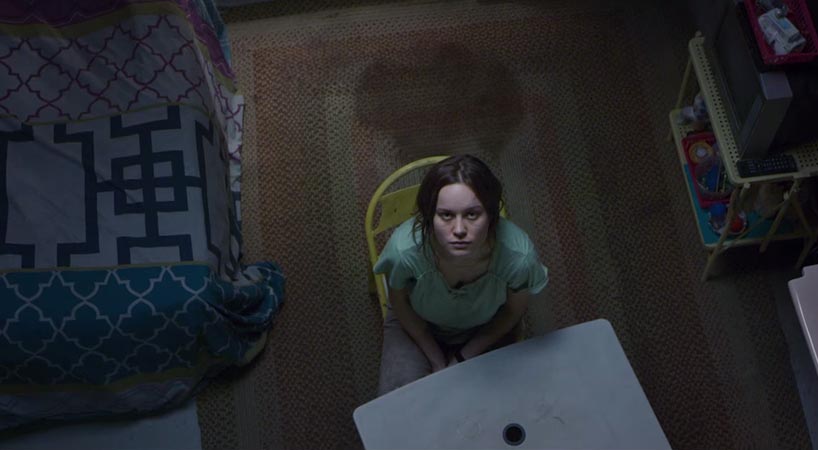
The 2010 sci-fi action film Inception features constructed realities in the form of dreams. Using special drugs, people in this movie can enter extremely vivid and realistic dreams; the level of detail and skewed perception of time in these dreams can even prevent dreamers from discerning the difference between dream and reality. These constructed dreams become even more like Plato’s cave of shadows when people use them like prisons, trapping targets in worlds they believe to be real so their subconscious minds can be interrogated.
One scene shows a group of people who go to a drug den in order to “be woken up” – they genuinely think their subconsciously constructed world is real, and reality is a dream. These addicts have become prisoners, and because they are trapped in their own minds, all the shadows are based on things they already know. Unless they are freed from this mental prison, they will never learn or accomplish anything truly worthwhile in the real world – but their story is not at all the focus of the movie. Rather, it is about master thief Dom Cobb.
At the end of the movie, Cobb is shown a dream where he can be reunited with his family – in reality, his wife is dead, and he is legally restricted from seeing his children, but in the dream he can be with versions of them constructed from his memory and even grow old with them. Cobb is tempted to stay in this world because, even if he overcomes the hurdles keeping him away from his children, he cannot bring his wife back in reality.
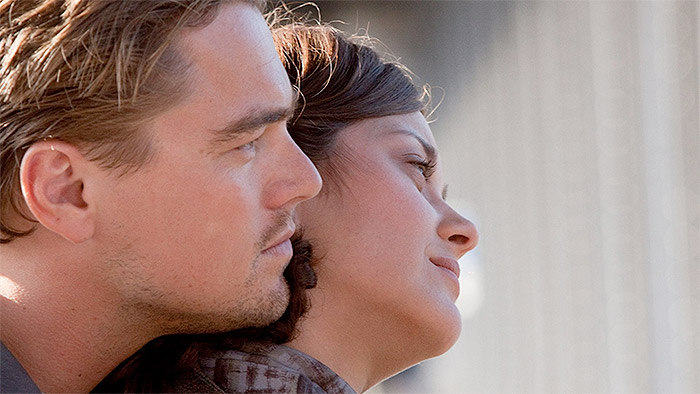
Another thing that keeps prisoners in their caves is the promise of safety. Plato’s allegory seems to assume that the prisoners are physically healthy. For the sake of the thought experiment, he ignored the question of how the prisoners get food and drink to sustain themselves, for example. If the prisoners were set free, in addition to gaining new knowledge of the world, they would also gain new responsibilities of caring for themselves. The shadows may be less real than things outside the cave, but they are also safer – the shadow of a knife cannot cut you, and the shadow of a flame cannot burn you.
In The Truman Show, when Truman reaches an exit door, he hears “the voice of God” also known as Christof, the show’s director. Christof encourages him to stay, so the show can continue. He points out that the outside world is full of deception, just like the world in this movie set, but the deceptions of the show are always for Truman’s benefit (at least according to Christof). Truman is safe in the show, just as the prisoners are safe in Plato’s cave.
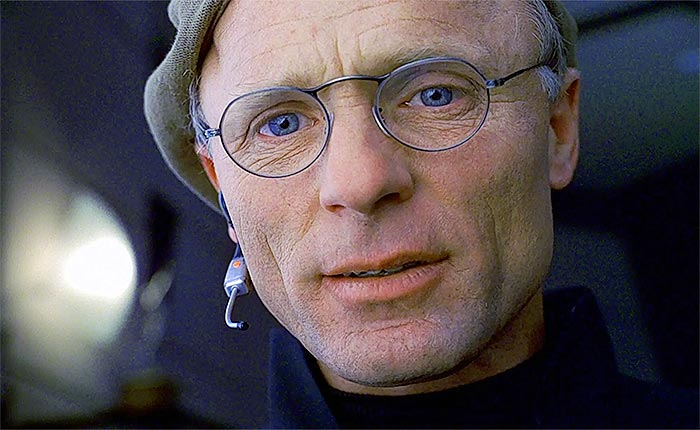
In The Matrix, humans’ physical bodies are kept in pods of fluid, hooked up to various wires and tubes through which they are fed nutrients. While they are very much defenseless in this state, they are also never threatened by anything outside their minds. Being set free from a pod looks a great deal like being born, cut free from an artificial umbilical cord and thrown almost violently into a dry, cold world full of dangers. This demonstrates the negative aspect of Plato’s metaphor for learning: it is an uncomfortable process.
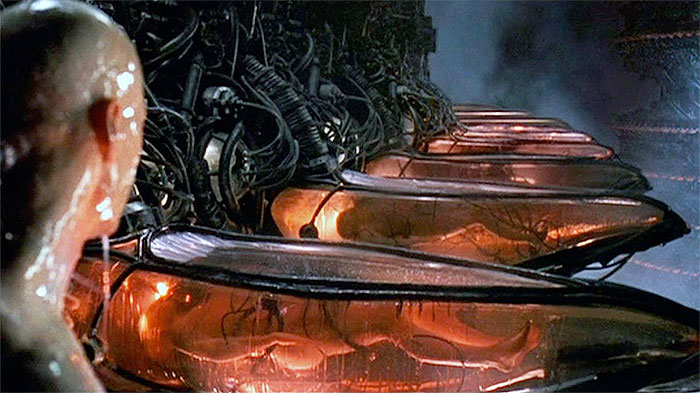
Cypher, one of the antagonists in The Matrix, wishes to return to the Matrix with no memory of the real world because the real world is post-apocalyptic. In the Matrix, he would not be fleeing or fighting for his life or struggling to survive underground. This is an understandable motive which calls into question Plato’s stance that the real world is better than the cave of shadows.
However, birth is an apt metaphor in this discussion for another reason: until someone leaves the cave (or the womb), they cannot mature to their full potential. Plato’s philosophy says the benefits of the knowledge outside the cave are more important than the risks.
Every protagonist in the movies discussed here eventually chooses freedom over staying in the comfort zone. In his movie, Neo gains many new abilities, from martial arts to telekinesis, that he could not have learned unless he was first released from the Matrix and granted the perspective necessary to “free his mind.” Dom Cobb explicitly calls his dream wife “a shade” of the woman he actually misses, “not good enough” to warrant staying in the dream world.
Is Ignorance Really Bliss?
The other element in this discussion is a moral question for the person who enters the cave from outside and finds the prisoners. Is it right for that person to free a prisoner? If the prisoner is initially reluctant to cross the threshold, how much should an outsider encourage them to come out into the real world? Although many people ultimately consider the benefits worth the risks, does that mean outsiders should force people to pursue those benefits, metaphorically dragging them out of the cave and into the light?
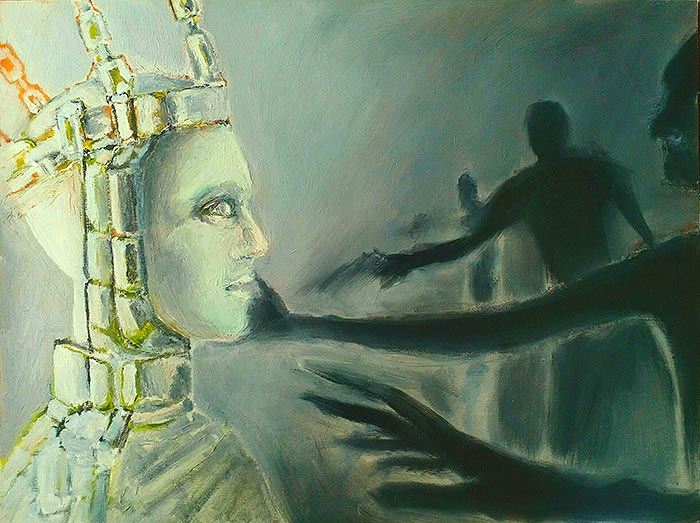
In The Matrix, Morpheus admits to feeling a moral quandary about freeing Neo. “There is a rule that we do not free a mind once it reaches a certain age,” Morpheus says. “It is dangerous. They have trouble letting go. Their mind turns against them.” Although the free humans hope for all of humanity to be free, they would rather free everyone at once, by striking the Matrix at its source, than break people out one by one, potentially traumatizing them.
Considering freedom of the mind as a metaphor for learning, it is easy to see this scenario happening in our own world. Many adults struggle to learn a subject, develop a skill, or otherwise gain an aspect of maturity he or she missed out on in childhood. “Forcing” such people to take the journey of learning can be seen as doing more harm than good.
The key difference between Plato’s allegory and reality is the main potential problem with all thought experiments: this situation would never happen in real life. If there were really people imprisoned in a cave who had been there for as long as they could remember, rational people would consider that cruelty on par with slavery. The rational response would be to free those prisoners – this would absolutely be the correct moral choice. Similarly, most audiences of The Matrix, The Truman Show, and Room understand that imprisoning people in virtual reality, a movie set, or a shed is wrong.
Pointing this out may seem like a nitpick with the format of the allegory, but it has an important implication. Some people may be held back from maturity because they are “prisoners” of something they did not choose. The morally right thing would be to “free them” by trying to teach them. This can be done through support of social programs and institutions that encourage adult learning (education of children is a given, as their ignorance is certainly not by choice).
However, if it seems the prisoner is willfully choosing not to pursue “enlightenment,” trying to force education on them may be counterproductive. If Baudrillard was right, the postmodern generation willingly chooses to get information exclusively from constructed realities. Informing these people that there are better things in the world outside their cave of shadows may be a good idea, but trying to force them to turn toward the real world may not be.
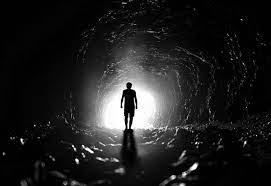
In past generations, protagonists like Alice, Dorothy Gale, and Jennifer Connolly’s character in Labyrinth could slip in or out of Special Worlds like Wonderland and Oz as easily as waking up from a dream. Modern and postmodern stories tend to draw clearer distinctions between reality and constructed reality, and escaping from false worlds is usually an important goal. This indicates an increased emphasis on focusing on what is real, even if it is uncomfortable. The alternative is staying trapped in the Matrix or the Truman Show for the rest of our lives. But it must be our choice, because we cannot always count on Morpheus to wake us up.
Works Cited
What do you think? Leave a comment.











Nice article. Yes, the pull to stay in the dream world is potent even when we realize it isn’t “real” and we have the option of escaping it. I love the final line as well. Not everyone meets a “Morpheus” to shake them out of that spell.
Excellent article, full of meaty discussions.
A good essay. There is a book in Political Science, Murray Edelman, The Symbolic Uses of Politics. As I read your essay I was thinking of that work, since it addresses some of the same issues that Plato discusses (perhaps why Plato’s The Republic is such a central part of the study of Political Science). The point that Plato’s cave extends to more than just movies, but can address issues beyond the silver screen.
As a point of reference for what modern “caves” may look like is the economic imperative to consume. In modernity, the shadows on the wall are products and memes. Via consumption, our identity is defined by the things we own. People and community don’t define who are; products give us essence of identity. Obviously advertisements, and the technology facilitating advertisements, are the people casting shadows. The chains are profit and short-term pleasure. The real world is thoughtful, novel discussion. The reason fecund dialogue is now the real world can be demonstrated by how painful deep conversation tends to be for most individuals. It’s hard to find fertile grounds for discussion; therefore, try to engage in dialogue with anyone who shows the slightest spark of interest. They are people starting to see the chains.
Interesting article, the Matrix is one of my favorite movies, so I enjoyed the discourse around it in this article.
Psycho-Cybernetics
Maxwell Maltz MD, F.I.C.S.
Prentice-Hall
1960
(The earlier releases, if you can find them, are best)
The ‘Matrix’ film could be said to represent a population of ‘prisoner’s because both your body and the presentation of your ‘external’ reality are FAKE, BUT you DON’T KNOW THIS and likely cannot escape anyway. In a Matrix reality, your proxy body is nothing more than a ‘shadow’ on the wall of a fake reality, because your real body is elsewhere.
Even more interesting is that if you ‘reality’ is real AND as given that the entire basis of the ‘Matrix’ artificial reality type is that your current body is fake then you’d imagine that a search for descriptions relating to the foundation ‘nature’ of what was fundamental to the Matrix films.
Very interesting read… which is saying a lot of your writing style because philosophy is often really tough to digest.
Even at this very moment, each of us are trapped in one’s own mind because of limited biological mechanism. We’ve been doing pretty great interacting utilizing symbols, but I wonder what it’s going to be if technology surpasses that of nature’s.
The Matrix is such a philosophical masterpiece, I love how the writers used some true events and turned it into Sci-Fi for entertainment purposes.
I actually see the matrix as an almost literal translation of the state of our world at the moment. that there is no escape from the matrix simply because those that are “fighting the system” are simply doing exactly what the system planned for them to do. thats why I’ve never wasted my time voting or protesting. I cant say that i’ve found a solution to the problem but at least i actually see the problem for what it is. for every million people slapping at the branches (symptoms) of evil, there is one chopping away at the root.
The Wachowski’s deserve way more credit for their films in my opinion.
Amazing work. Have you ever looked into Plato and HP Lovecraft?
No, I haven’t. Just based on what I do know, I would say Plato’s philosophies take a more optimistic outlook and Lovecraft, in the interest if horror, would go a more pessimistic route, if and when the two of them consider the same ideas.
I think a lot of people who grew up working with computers or playing video games are more inclined to a sort of idealist metaphysics than people of say, the 19th and 20th century were. The concept of “software” and the fact that you can run the same program on different machines indicates that a program has an eternal, immaterial existence of some sort. If you wrote a program out in full on a sheet of paper and then typed it into a computer a hundred years from now, you could run the same program. This shows that “Idea”, information, or mind actually does transcend the material used to manifest its presence, and must be said to exist in some sense. In an information-machine culture the phenomena which Pythagoras and Plato tried to describe is far more obvious than it was to scientists of the last couple centuries.
I remember this from first year Greek philosophy. So much time has passed since I last thought of that allegory and it’s as true to say it was yesterday.
I still don’t understand.
The films are loosely based on a theory by Plato. it says that if you took some people as babies, and chain them in a cave, facing a wall, so they can’t turn around, and then outside the cave, light a bonfire, and have objects and creatures moving in front of it and making noises, the prisoners would think the shadows, were alive and making the noise. If one of the prisoners was set free and discovered that the shadows weren’t alive, just reflections, the prisoner would think their old life was worthless.
We watched Truman Show in my theology class sophomore year to show that we obviously have free will in the world for this fact that no one can be caged for so long (according to my teacher) cause I still like to ponder the idea of lack of free will in the world.
The Truman Show and The Matrix are my favorite movies ever. When I look at the world with my third eye, i guess, thats how I see the world, kinda like I am Truman. I sometimes (occasionally ) believe I can mold things that are happening in my life, only boundary to this miracle is again, my mind…. When my mind puts blockage, and resists things, then I am back to Matrix.
You leave the cave by acquiring knowledge and wisdom. The more you learn the more you understand reality for what it really is. This is also an example of the forms which they talk about in Plato’s Republic. The one who escapes the cave is the philosopher, because he is the only one that is able see things as they are. He’s a truth seeker. Lover of wisdom.
There is so much that you can say about the allegory of the cave that a whole book can be written about it.
The Truman Show, like They Live and The Matrix, are great examples of movies with intriguing philosophical thought behind them.
Very few movies come that are really ground-breaking and life changing in some ways. ‘Matrix’ is one of them (particularly the first part). I remember after watching this movie for the first time. I told my friend- “It is the best movie I have seen.”. It not shows the filmmakers passion for presenting and making such a film but to give some thought provoking messages.
I feel like it has become slightly underrated because the sequels weren’t well received, but it really holds up as some great filmmaking. Looking forward to the 4th film.
I feel the sequels don’t get the credit they deserve. the highway chase in the second part till this day still amazes me each time even after so many views. the way it builds up from the fight with the frenchman’s thugs and how they have to separate so morpheus can rescue the keymaker, their subsequent fight with the twins in the parking lot that leads to them escaping in the sedan. the “never tell me the odds” (han solo) moment where morpheus tells trinity to go on the highway. how the agents come in to cause mayhem and the subsequent showdown with morpheus atop the freighter and the grand finale where neo comes in and catches them mid explosion. just absolutely so many things coming together in one of the greatest cinematic spectacles i’ve ever witnessed. yea they have their flaws but they more than make up for them with everything they get right.
The red pill is definitely psychedelic reference and eastern metaphysics of becoming disillusioned about the nature of reality.
Wonderful article! Very thought provoking, I do have questions myself at times especially with all these supposed videos popping up of alleged “glitches” in the “system” being captured. Palm branches suspended in air, reflections in mirrors not reflecting correct images, black squares punched out in the sky; are just a few I can name.
I just spent this past summer reading Plato’s dialogues and have also been meditating on the various myths he discusses in his writings and how we continue to investigate these themes in our own modern myths. Rad article. Thank you.
We are all living in a cosmic computer game being played by the overlords of the universe. Everything you think or do is all predetermined so absolutely nothing matters. Stop worrying, stop caring, what ever happens happens.
That’s the problem with determinism: if everything you think is predetermined then your belief that everything is predetermined (or the contrary) is also predetermined. There is therefore absolutely no point in discussing it – we are only doing so because we don’t have the choice.
Bearing in mind that I feel as if I have free will, the only sensible way to use it is to dismiss the idea that everything is predetermined: either I’m right or I couldn’t help being wrong anyway.
Great read. Please write more content like this tying movies and philosophy.
The cave and the Matrix both have the motive to control its residents if they ate living in a fake reality or a living.
Something I never understood about the matrix – how did real world become like that? So much so that everyone became enslaved in the matrix?
Go watch the Animatrix series. It details the fall of mankind at our own hands via AI and robots.
I been reading on this stuff and I still don’t get it. Can someone please explain like I am five.
What we conceive is real through our senses of sight, hearing, smell, taste, touch are just electrical messages our brain receives.They can be tricked like an illusion.
What does it mean to wake up tho? Like say someone wakes up what does that even mean? What is the reality? When we are constantly being lied to by everyone what is real?
It’s an allegory, which means there are multiple interpretations. It’s supposed to make you use your brain. “Waking up” can mean realizing the truth about how governments are basically a system to oppress the masses. If everyone “woke up” and realized that governments are screwing us over, we would all rise up and overthrow those sneaky bastards. Instead, they invest billions to make sure we stay stupid through tv, movies, music, food and so much more. Within the context of The Matrix, waking up means realizing that their world is actually run by machines and that humans are used as batteries aka energy sources. In plato’s allegory of the cave, waking up meant realizing that someone was showing the prisoners shadows as if that was all of existence, when really there’s a whole world to see.
Great article. The Animatrix also possesses a wealth of philosophy to ponder and reflect on and is my favourite of the films.
My philosophy teacher always uses Matrix as the secondary example for Plato’s Analogy of the Cave and a great watch to play “Where’s Waldo?” in a philosophical way.
Having seen the matrix way to long ago I can’t help but shake the feeling that they are utterly failing at attempting to display philosophy though.
I love philosophy (I have both a BA and an MA in it) and seeing how Ghost in the Shell (the great inspiration for this movie) is already a rather shallow and simplified assessment of certain philosophical concepts, I find that the Matrix movies, especially the sequals, operate mostly on the level of trying to blow the simple man’s mind with baby’s first philosophy. There is no nuance to it, the philosophy it references is the first stuff you learn over simplified and in my opinion incredibly common sensical (‘how do we know we aren’t in a matrix right now? How can we know anything for sure?!’) and I am personally not of the opinion that the anglo-saxon thought experiments have any real philosophical weight to them (they forego a lot more intersting questions about being in favor of ready made ‘problems’ that one can then attempt to solve).
Especially the architect scene is really just ‘here is a bunch of philosophy jargon that will make people who don’t understand it feel stupid and people that do feel incredibly smart, even though the subject matter is a movie version of an incredibly simple and often used utilitarian thought experiment’.
I believe that this allegory is still applicable today especially when we’re raised with loads of beliefs e.g. religions, politics etc. that we are sometimes blinded how we should live our life i.e. ought to live. People can exercise their powers on us but this allegory does make sense for those who impose beliefs on us so that we would serve them instead of actualising ourselves through probably deep thinking, reflection, ponder etc.
Your analysis of the movies are great and the selection of movies is just what I enjoy watching. Thanks!
Did Truman show, the 20+ year old movie’s ending predict the current world? Truman walking through that doorway: tell me, what else is rectangular and pitch black (sometimes) that we use every day and are somewhat addicted to? And he willingly chose to walk right into it. Hmmm…..
The premise of this movie has a lot of problems. If the show didn’t want him leaving, or even thinking of leaving, why teach him about the rest of the world at all? Why give him a car when his wife can bike to work? Why not have a remote shutoff for the car instead of risking his life with road flames(amazingly timed and placed)? Why are there vending machines in a market? And why would anyone want to watch a show about a guy with a boring scripted life who can’t go anywhere? It’s the opposite of the genius of reality tv, which requires no script, actors, or really any planning whatsoever, which, along with seriously dysfunctional people, is what makes it spontaneous and interesting. I imagine watching the Truman Show would be like watching a 24 hr feed of candid camera, except it’d be the exact same people every time and no practical joke. Also, I’m assuming the producers were planning on Truman living his whole life in the show, never telling him the truth, until he dies. Then I guess they find a new subject/actor/slave for the next show. Only seriously disturbed people would be entertained by a show about someone imprisoned for life for no reason without even knowing it, unless it’s about him trying to escape.
Think about this: reality is open to interpretation. for these cavemen, their reality is the shapes and shadows they see. But to ourselves, our reality is everything we see in front of us; vehicles, people, buildings, smells, sounds.
Here’s the tricky part: all those things are interpretations of the electrical impulses captured by our senses and interpreted by our neurones
This applies today. Which of us are ascended outside and which of us are chained to stare at the shadows.
This can be interpreted as a strong metaphor for the process of lucid dreaming, the physical waking world is the wall of shadows, and the different stages of awareness when you realize your in a dream.
Truman only wanted to explore and be free was trapped in his own cave not knowing the outside world even existed, and the world who had the freedom that Truman wanted could only waste their lives and spend their time watching him on TV.
What you fail to realize is that the outside world IS the cave, or did you think they had television in Plato’s time?
Matrix means womb, or cave (in the sense that Christ emerged from the womb born in a stall which was actually a cave).
Really interesting read. I particularly enjoyed the discussion at the end about the morality of freeing someone from “The Cave.” If we were to extend this discussion into the real world, where morality is much greyer than we see in the media texts you’ve mentioned, there would be some compelling debates to be had about what “free” is, and who gets to decide what knowledge constitutes “enlightened.”
Although at present we live in worlds within worlds (due to the emergence of the internet), there is the blindness in humanity, in its inability to see the existence of the soul in the eternal world of the soul that exists beyond this (material) physical dimension. ‘The matrix does have us all’, as we spend infinite lifetimes making countless mistakes in our choices, in our search to reach nirvana and to be one with the light (in being enlightened) and find peace for eternity.
Matrix is somewhat the concept of maya in hinduism which says that the world around us is an illusion as our 5 senses take us away from the truth the truth is the soul and spiritual world and rest is just an illusion.
Life in the cave is like life in the matrix, never knowing the truth of reality.
I never understood platos cave until now. When I was a little kid I remember feeling bad for the prisoners but I didn’t know why. Also, wouldn’t the prisoner that was set free be skeptical of the shadows from the sun and use the wisdom he learned from the shadows?
This is exactly how you feel when coming out of a cult. It’s about ideas, not physical things.
I believe the shadows are reflections of interpretations of the forms. The form would be the sun (courage for example) and an object of a lion would be one interpretation of courage and the shadow is the reflection of that object. If parenthood is a form then Eminem experienced one interpretation of that form and his music is a meer reflection of that interpretation – the problem is when teens etc take the reflection or the one interpretation as the true form of parenthood (or life in general).
The thing I find interesting is the motif behind the creator, why did he create the Truman show to begin with? I believe he was hurt scorned by the world seeing it in a nihilistic negative view. And maybe he believed if he could control maybe he could change that. Afterall Truman’s set of morals right from wrong has all been defined by this one man what he defines is right or wrong. And this is his way of instilling that to the worldwide public, because if the people love Truman and what he stands for then so to should they. And that explains why he has this protective nature with Truman. Not wanting him to see the world for what it is, he’d rather shelter Truman from it all to protect someone in a sense pure from the real world.
Used this to revise for a philosophy article, was very helpful.
What happens when the prisoner realizes that the real world contains the same amount of crap, if not more, than the predecessor?
What I love most about The Truman Show is the simple display of the human spirit. Truman knows something is wrong and that he isn’t free, and he wants to find Sylvia. He has no idea what’s out there, but he risks his life just for the possibility of true freedom and a real human connection. Everyone watching, even the people in the control center, empathize with him because a desire to know the truth and to feel love is such a fundamental human need.
I absolutely love The Truman Show because it really makes me think. I wrote an essay for school on how Christof should be convicted for attempted murder, and I love delving deeper into the moral dilemmas proposed by the film. Should truman have had the freedom to be with Sylvia? Was Christof really helping Truman? or was he imprisoning him? Etc. Etc. I could go on for hours. Anyways. 🙂 Great analysis!
We are a product of our reality just as our reality is a product of us.
The Hero’s Journey’s original model seems to come in many marts from The Iliad and The Odyssey.
I like how you integrated the abstract Morpheus figure to make your point. I feel as though we are battling with the machine-human dichotomy more than ever. These films allude to the notion that conscious, human existence is on the verge of extinction.
I was really intrigued by this article and thrilled that someone else had realised the importance of Plato’s Allegory of the Cave. Recently, I started re-reading my set of Isaac Asimov novels and was enchanted by them all over again. As I re-read The Caves of Steel and The Naked Sun, the distorted world of the future bore an uncomfortable resemblance to that of our own troubled society. I was struck by the parallel between the narratives of these novels and Plato’s Allegory of the Cave and also by the fact that both these elements seemed to address issues of particular significance to the period of lockdown and self-distancing we are currently enduring. (I hasten to add that I am not alone in seeing evidence of Platonic theory in Asimov’s work. In “Political Myths in Plato and Asimov,” Nathaniel Goldberg, Professor of Philosophy, Washington and Lee University, speculates on the possible influence of Plato’s Republic on Asimov’s Foundation Trilogy). The novels describe two worlds – both peopled by humans – one is dirty, subterranean and overcrowded. The other, Solaria, has inhabitants who live alone on private estates, served by robots and consciously avoiding physical human contact. In short, the similarities I observed from reading both the Allegory of the Cave and the Asimov novels in the light of the Covid 19 crisis were as follows:-
Plato’s Cave – Asimov’s Earth – Present Covid 19 Earth
Inhabitants locked away
Fear of isolation
Fear of facing the truth, rigid thinking
Accepting ‘fake news’
Negative reactions – e.g.medievalists, Covid19 deniers
Resistance to change
Plato’s Cave – Asimov’s Solaria – Present Covid 19 Earth
Inhabitants self distance/isolate
Fear of touch
Over reliance on technology
Covert desire for illegal physical contact
Accepting ‘fake news’
Without wanting to sound too pessimistic, in today’s world lessons have not been learned from Plato, from Asimov or from contemporary scientists. Plato and Asimov stressed that action should be taken in the light of concrete evidence by enlightened experts in the field and not to frighten, placate, confuse or silence the populace. Let us hope that the lessons of Plato and Asimov get some recognition in this troubled world.
Good work! I especially liked the films you chose as modern examples of Plato’s allegory.
I believe that it’s impossible to break out of the social “matrix” imposed upon us, for the political systems will make sure that all we have access to is a constructed and fabricated reality rather than the real reality per se. Perhaps the best means of creating such a constructed reality is the media, this inescapable Adornian culture industry, which literally creates the reality for us, based on the propaganda and ideology of the dominant class, in a way that the Baudrillardian copy (unreal reality) becomes more believable than the real reality. The political systems, even the so-called democratic ones, will always prevent us from having access to the reality, for the enlightenment of the individuals is tantamount to the loss of the power of the governments. All of the different types of media and the entertainment industries, in my eyes, have been programmed in a manner that they only create the reality that the political system wants us to see (the constructed reality).
Plato’s allegory has many contemporary links, I believe. Considering the upcoming ‘Meta-verse’ and the concept of ‘reality’ being rather subjective, I believe Plato’s allegory will continue to speak to cultural specificity of reality. Ongoing advancements with virtual reality and augmented reality technology are also ones to watch out for in the next few years.
A lovely meditation! Thank you for writing this piece. That said, I understand simulacra and Plato’s allegory of the cave differently. Plato’s allegory is that all of human’s experiences of “reality” are reflections and not objective materiality. Simulacra is yet another (!!) layering of meditation caused by Benjamin’s mechanical reproduction. So films like The Matrix and Inception mediate on a nostalgic and ideological notion of “reality” and never really go far enough to show the absurdities of assuming reality is stable or fixed. There is no unitary reality. Right?
Close, but the idea of Plato’s allegory is that there is a real, stable, fixed reality that is not the shadows on the cave wall. It’s possible to stop meditating on reflections and realize greater truths; this is the journey illustrated by the Matrix, the Truman Show, etc.
Fascinating! Thank you!
I found this to be an interesting read. Especially the discussion regarding the morality of freeing someone from their “cave”. With the access to media becoming streamlined in the past few generations, escapism has become a favoured pastime. As such, there are those who purposely reject reality and instead actively subject themselves to their own “cave”.
I’m confused as to why you don’t mention René Descartes and his ‘Meditations on First Philosophy’ (1641). Descartes even talks about a ‘mad scientist’ projecting the world that we see. In The Matrix, they aren’t ridiculously chained to the floor and just seeing shadows but are living (at least to them) full lives that mimmick true reality (outside the Matrix, minus the war). The movie is easily argued to be far more like ‘Meditations on First Philosophy’ than Allegory of the cave.
I didn’t know anything about Descartes’ work on the subject.
Although people in the Matrix aren’t chained to the floor, they are very much stuck in one place by wires and tubes. The “reality” they see is fake, just like the shadows are fake. They’re not living full lives because they’re spending their entire lives in tubes. True reality is a post-apocalyptic wasteland with no sunlight. The Matrix looks a little different from that.
The people in Plato’s allegory think the shadows are reality, just like people in the Matrix think what they’re seeing is reality. Descartes’ story might also be similar to The Matrix and other movies about false realities, but Plato’s allegory works just fine.
As obtuse as I find Plato’s philosophy, I think the discussion about freeing oneself from the ‘cave’ is an interesting thought. I wonder if the cave has become easier or harder to escape?
I greatly enjoyed reading this article! Breaking down the arc of the hero’s journey in stories is always fascinating to me, and tying together Plato’s Allegory of the Cave and post-modern movies like The Matrix was intriguing to read as well. Thank you for writing it!
The intertwining of the Allegory and the Hero’s Journey was truly masterful to read. The only critique I can even think of is to differentiate Plato and postmodernism as they kind of blend together in the intro paragraph. Incredible writing!
Great analysis! Really enjoyed reading this. You included some great examples. Especially including Room, which I wouldn’t have expected to see here but fits perfectly
I think that existentialism ties into this idea as well. Once Neo has mastered his understanding of the world, he is able to control it. The same is true for Inception as well. By re-entering the constructed world, they can affect indirect change on the real world. In existentialism, the individual can construct their own reality. This is seen here-people affecting direct change on their lives after having ‘woken up’ to the possibility of said change.
This is always a fun topic of conversation, thank you for sharing in such a creative way.
Would love to know what you think of Us dir. by Jordan Peele in relation to the cave
Interesting. Doesn’t really fit the metaphor because in that movie the underground people seem to be very aware of the above-ground world, and they need no convincing that the above-ground world is better than the “shadows” they’ve been experiencing.
The moral of the story of the Cave is that it’s good for people to leave the Cave behind and pursue reality. That moral doesn’t really fit a movie where the Cave people want to kill and possibly replace the Surface people.
A good essay. It is always intriguing that something from ancient times still is seen as relevant to the present. I frequently refer to Thucydides in courses and his ideas, his thoughts, still matter now. Here, Plato still matters: Human nature has a way of transcending technology, or modern times.